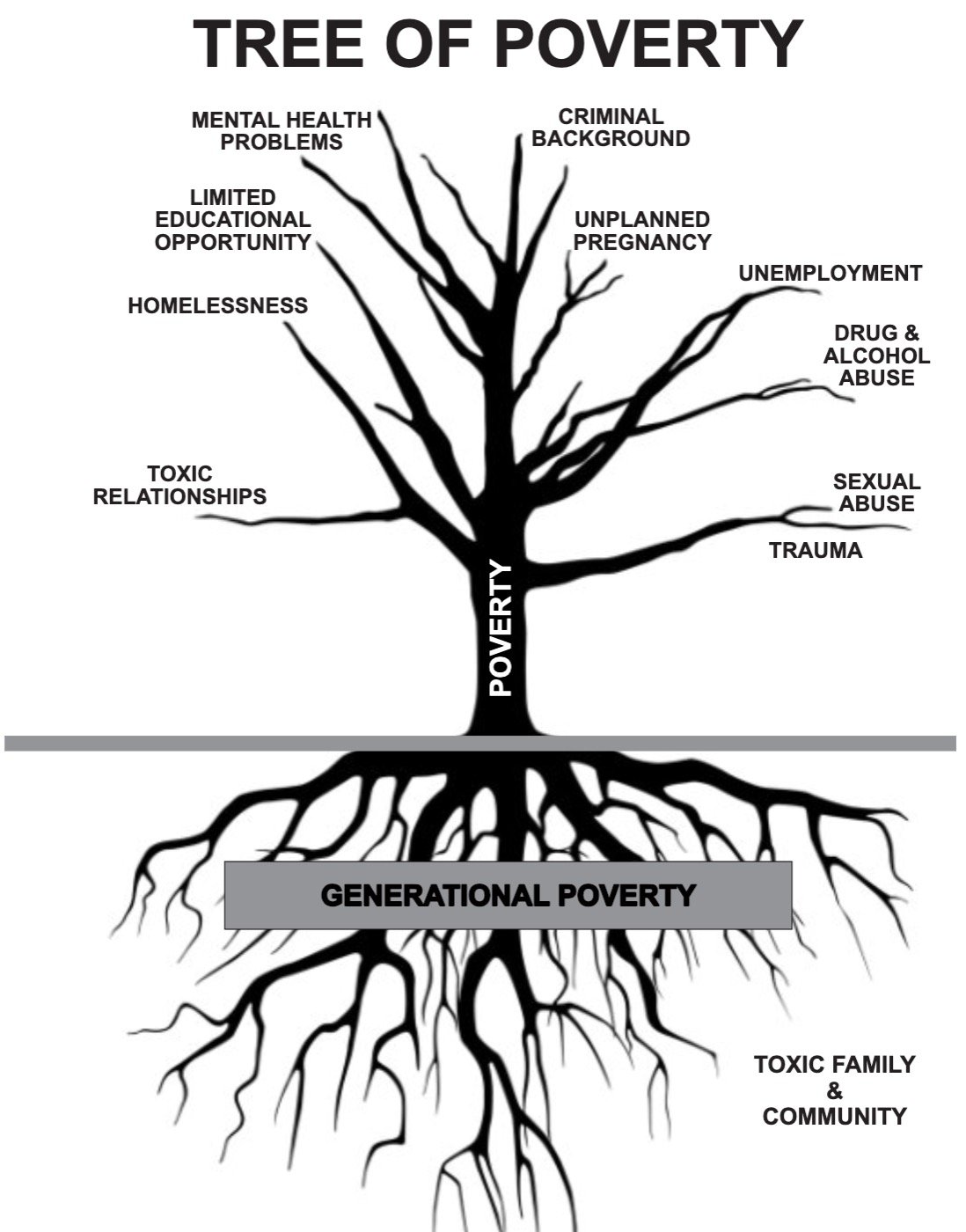The Root Cause
On January 11, 1964, Dr. Luther L. Terry, the Surgeon General of the United States, released a landmark report that identified cigarette smoking as a chief cause of lung cancer in men and a probable cause of lung cancer in women. This report led to the passage of two laws in 1965 and 1969 that required a warning label on all cigarette packages and banned cigarette advertising in broadcast media. Over the last 60 years the number of smokers has decreased significantly and, as a result, the number of deaths due to lung cancer, emphysema, chronic bronchitis, and other smoking-related diseases has also decreased significantly.
Understanding the root cause of problems is a significant step towards finding better solutions. For women coming to Ruth Harbor, the root cause of their problems is generational poverty. (As Christians, we understand sin to be the root cause of mankind’s problems. In this case, sin is manifesting itself in the form of generational poverty.)
Generational vs. Situational Poverty
Generational poverty and situational poverty are two distinct forms of poverty that differ in their causes, duration, and impact on individuals and families.
Generational Poverty:
Long-term Cycle: It refers to poverty that persists through multiple generations within a family.
Structural: It's often deeply rooted in systemic issues like lack of education, limited access to opportunities, and systemic barriers that prevent upward mobility.
Cultural and Social Factors: Generational poverty can be influenced by cultural norms, family patterns, and limited exposure to resources beyond the poverty cycle.
Persistent Nature: Families experiencing generational poverty may struggle with poverty consistently over many years or even across several generations.
Situational Poverty:
Temporary Circumstances: It is caused by specific events or situations like job loss, illness, divorce, or other sudden changes that disrupt financial stability.
Short-term: Situational poverty is typically temporary and can often be resolved once the situation causing the financial strain is addressed.
Potential for Recovery: Individuals or families experiencing situational poverty often have a greater chance of overcoming it through support, interventions, or changes in circumstances.
Not Inherently Structural: Unlike generational poverty, situational poverty is often not tied to systemic or cultural factors but is more situational and specific to certain events or challenges.
Understanding these differences helps us see generational poverty within the context of a woman’s entire life experience. She was born into poverty and has never known anything different. Her experiences have a profound impact on her life and shape every aspect of her worldview.
As you can see in the Tree of Poverty, unplanned pregnancy is only one of many symptoms that grow out of generational poverty. In order to help women and their children out of this life, we need a longer investment of time. Yet, we want to be careful not to create a dependency that only deepens their problems. If you want to read more about this delicate balance, see When Helping Hurts: How to Alleviate Poverty Without Hurting the Poor . . . and Yourself (Corbett & Fikkert, 2014).
The model for Ruth Harbor 2.0 is adding generational poverty as a fundamental issue we need to address when a new resident arrives at Ruth Harbor. This expands our vision in a significant way, and in the short time we have brought this problem into our field of view, we have seen greater impact with the mothers we have worked with this past year. We learn something new from each mom we serve. In some ways, our current moms are helping us better serve the women who will call Ruth Harbor tomorrow.
Key Lessons
While it is an unplanned pregnancy that brings a woman to Ruth Harbor, it is only one of many issues we must address if we are to see true healing and life transformation.
Generational Poverty is the root cause of the issues that have shaped the life and worldview of the women coming to Ruth Harbor.
Helping a woman out of generational poverty takes a longer-term commitment than we can provide during their stay in our homes.
Resources
When Helping Hurts: How to Alleviate Poverty Without Hurting the Poor . . . and Yourself. When Helping Hurts is a paradigm-forming contemporary classic on the subject of poverty alleviation and ministry to those in need. Emphasizing the poverty of both heart and society, this book exposes the need that every person has and how it can be filled. The reader is brought to understand that poverty is much more than simply a lack of financial or material resources and that it takes much more than donations and handouts to solve the problem of poverty.
RuthHarborCares.org (our website for those interested in joining Ruth Harbor as a financial partner).
RuthHarbor.org (our website for women seeking help).

